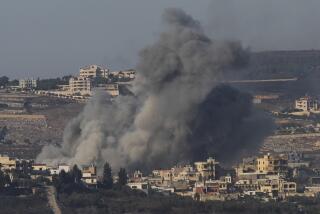Lebanese Army Takes Over Militia Zones : Military: It is its boldest step to end 16 years of lawlessness. Christian and Druze areas are affected.
- Share via
SOFAR, Lebanon — Regular army soldiers took control in the mountain fiefdoms of Lebanon’s two strongest militias Wednesday--their boldest step to end 16 years of civil war and lawlessness.
Waving red-and-white Lebanese flags and making V-for-victory signs, troops on trucks, armored carriers and tanks moved into a Christian militia enclave north of Beirut and a Druze stronghold southeast of the capital.
Militiamen left the streets before the army drove in.
“This shows the country is in good shape!” exclaimed Bahij Shaya, watching more than 100 soldiers put Sofar, his village in the Shouf Mountains southeast of Beirut, under central government authority for the first time since 1975.
“The guns have stopped, and the government is in control,” he added.
Other residents offered the smiling troops tea and coffee, and children played on the patrol’s four Soviet-made T-54 tanks.
An estimated 8,000 Lebanese soldiers, led by U.S.- and Soviet-made tanks, thrust into the territory held by Lebanon’s two largest militias--the Christian Lebanese Forces and the Druze Progressive Socialist Party.
The operation brought at least a quarter of Lebanon under government control, in line with the Taif pact, an Arab-sponsored peace plan backed by Syria and the United States.
Reuters correspondent Michael Kuli reported from the Christian heartland northeast of Beirut that residents fired pistols in the air to celebrate the army’s arrival in Ghosta, a stronghold of the Lebanese Forces.
“They’ve arrived, they’ve arrived!” shouted one man as hundreds of soldiers fanned out through the village in heavy rain and mist.
Some Christians in former Lebanese Forces territory were concerned that soldiers would allow gunmen from a rival militia in to take reprisals.
“We felt secure with the LF (Lebanese Forces). Now we fear theft and violations,” said carpenter Michel Akiki in the port of Juniyah.
“It is a historic day in the life of our nation,” said Defense Minister Michel Murr. “With this deployment, Lebanon has moved a step forward in the peace process.”
“Be strong in carrying out the mission and imposing law. Be wise in dealing with thorny issues. Be peace-seekers,” the army commander, Gen. Emile Lahoud, told his troops after the move.
A government deadline for the militias to disarm expired at midnight. On Wednesday, the government starting paying about 20,000 militiamen $100 a month each to support them until they join the army or are hired by other state bodies.
In another step toward a durable peace, the Lebanese Forces militia returned to the army 48 tanks, 38 artillery guns, 47 armored troop carriers, 370 other vehicles and seven helicopter gunships that it had captured.
The Progressive Socialist Party is made up of Druze fighters, who belong to an offshoot sect of Islam. The party has been giving its weapons, many of which were supplied by Syria, to the Syrian army since last week. The militia’s arsenals are so large that it could not meet the May 1 deadline to surrender them all.
Several other militias with close links to Syria have handed in some of their weapons in recent weeks.
After consolidating control in former militia territory, the army has until Sept. 20 to deploy in all the rest of Lebanon.
About 40,000 Syrian troops hold two-thirds of Lebanon. Israeli troops and an Israeli-backed Lebanese militia control a “security zone” in the south that Israel has said will remain until the Beirut government can stop guerrilla raids into the Jewish state.
More to Read
Sign up for Essential California
The most important California stories and recommendations in your inbox every morning.
You may occasionally receive promotional content from the Los Angeles Times.










